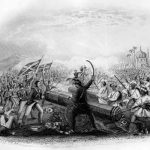FOUR BATTLES THAT CONDEMNED INDIA TO COLONIALISM
A ride through colonial history (Continued)
Battle of Seringapattam, 4 May 1799
The last 3 decades of 18the Century saw Southern India broiling in a contest for supremacy between two power centres, the English East India Company based at Madras trying to expand its hold in the region and the Sultanate of Mysore with its capital at Seringapattam flexing its muscles to dominate the whole of South through conquest. Unlike the Mughals in the North, Mysore, initially under Haider Ali – a hawkish military leader who had usurped power from the Maharajah – and later under Tipu, his son, had prioritized the development of its army, using French expertise in training when needed, and had a highly professional and combative army. A cavalry oriented force, it set the Carnatic ablaze for the three decades, giving the British a run for their money as the two engaged each other in 4 confrontations in series that came to be called the Mysore Wars. The first two of these saw any number of seesaw battles with changing fortunes between the two sides but essentially the Mysoreans holding an upper hand for their advantage in cavalry which the infantry-oriented Madras Army of the British lacked; many a Briton ending up prisoner in the dungeons of Seringapattam. Then in early 1792 at the end of the 3rd Mysore War, the Madras Army, by then augmented by its cavalry and artillery elements, and commanded by Lord Cornwallis (struggling to restore his military reputation after his humiliating defeat in the American Civil War), managed to corner Tipu Sultan, outnumbered in his fortress capital of Seringapattam, and force him to seek terms.
It was war again by 1798 as Tipu entered into an agreement with the French with promise of help from Napoleon. The British mobilized their forces and by early April 1799, the Madras Army commanded by General George Harris, supported by Bengal and Bombay Army contingents and those of the Nizam of Hyderabad and the Marathas, altogether a massive force of over 40, 000 with its full complements of cavalry, artillery and pioneers, laid siege to Seringapattam. After a period of intense shelling by each other for a month – which saw the world’s first instance of rocket warfare innovated by Tipu’s arsenal – the allied armies under Harris stormed the fort of Seringapattam during the afternoon of 4 May 1799. After intense fighting that lasted until nightfall, Tipu’s outnumbered garrison of 21000 – a great part of his army was scattered holding various other forts – was overpowered by the attackers. Tipu fell fighting along with 10,000 of his men and with that South India came under the British power.
Tipu Sultan was the most feared opponent of the British in the subcontinent. A gallant soldier who fought till the last, he failed on several counts as a general. By withdrawing into a defence in his fortress capital instead of chipping away the enemy strength in field battles, he gave away his inherent advantage in cavalry. Unlike his father, he lacked flexibility and was not prudent enough to heed to sane advices given to him to cut and run – to fight another day – when the odds were against him. His faith in astrology also made him somewhat of a fatalist who chose martyrdom over sound strategy. There was of course the factor of betrayal as well. Tipu too had a traitor in his camp. Strangely another ‘Mir’, Mir Sadiq, the Sultan’s Dewan, enacted the role of Mir Jaffer at Plassey although on a much smaller scale. In connivance with the British, he withdrew troops guarding the one breach available to the attackers in the nick of time under the pretence of a pay distribution and is believed to have given a signal to the enemy. However, unlike Mir Jaffer who lived to savour the fruits of his treachery, Mir Sadiq didn’t even survive the day – even as fighting raged within the fort, he was slain by men loyal to the Sultan.
There has been a recent political debate about Tipu Sultan; one side trying to glorify him as a patriot and freedom fighter and the other side vilifying him as a religious bigot. He was neither. He was just a product of the times; a ruler trying to expand and establish his domain. That’s exactly what East India Company was up to and naturally they turned arch enemies. He couldn’t care less about Indian freedom, a term that bore no relevance to the period anyway; the country was yet to be formulated geographically and politically. And if we are talking about resisting alien invasion of our land, he is one of the rulers who turned down Mahadji Scindia’s proposition for a pan-Indian union of native rulers. So much so for his patriotism. As far as the charge of bigotry goes, the fact that most of his soldiers were Hindus does not validate such a theory. About the atrocities he committed: Retribution for resistance by an enemy was the order of the day. Both the Nairs of Kerala and Coorgs gave him a hard time and he had to take it out on them (He was lamed for life during a humiliating reverse he suffered against Nairs at Nedumkotta). And religious persecution always found favour as a means of retribution. Tipu was a ruthless military adventurer with grand territorial ambitions; nothing more and nothing less.
[To be continued. Next: BATTLE OF ASSAYE]






Sir, I am new to this website and came to it through an article in The Hindu on the reenactment of the Battle of Adyar by NCC cadets. And now I have started reading your blog posts. In this post, you state “After a period of intense shelling by each other for a month – which saw the world’s first instance of rocket warfare innovated by Tipu’s arsenal – the allied armies under Harris stormed the fort of Seringapattam during the afternoon of 4 May 1799.” But weren’t the famous rockets used earlier in 1780 in the Battle of Pollilur… Read more »
Yes, I too have come across references of these rockets being used at Pollilur; but I suspect the authenticity of it. For one thing the British records I came across mention the rockets in the context of Seringapattam only. Besides Pollilur was a field battle; it’s highly suspect whether the Mysore Army could move the launching mechanism around. Also if they were in possession of rockets in 1780 why weren’t they used during the 3rd Mysore War (1789 – 92) even when Cornwallis laid siege to Seringapattam in 1792 forcing Tipu to seek terms? Pollilur was a brief but fierce… Read more »